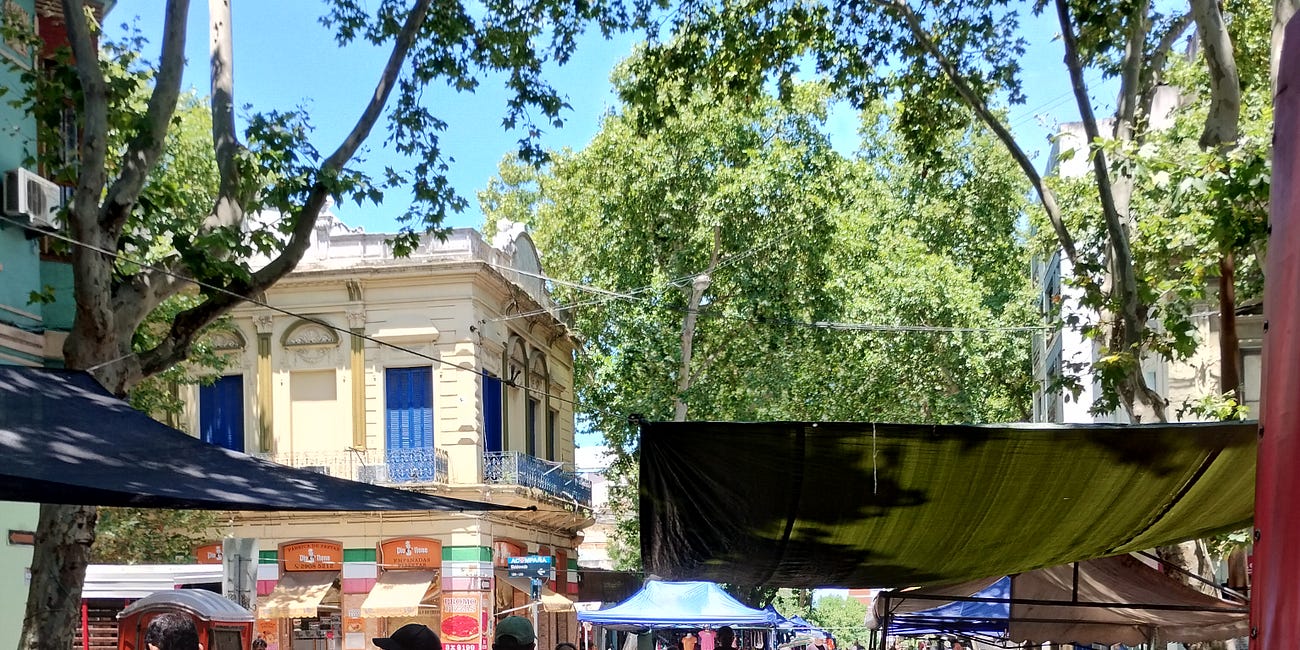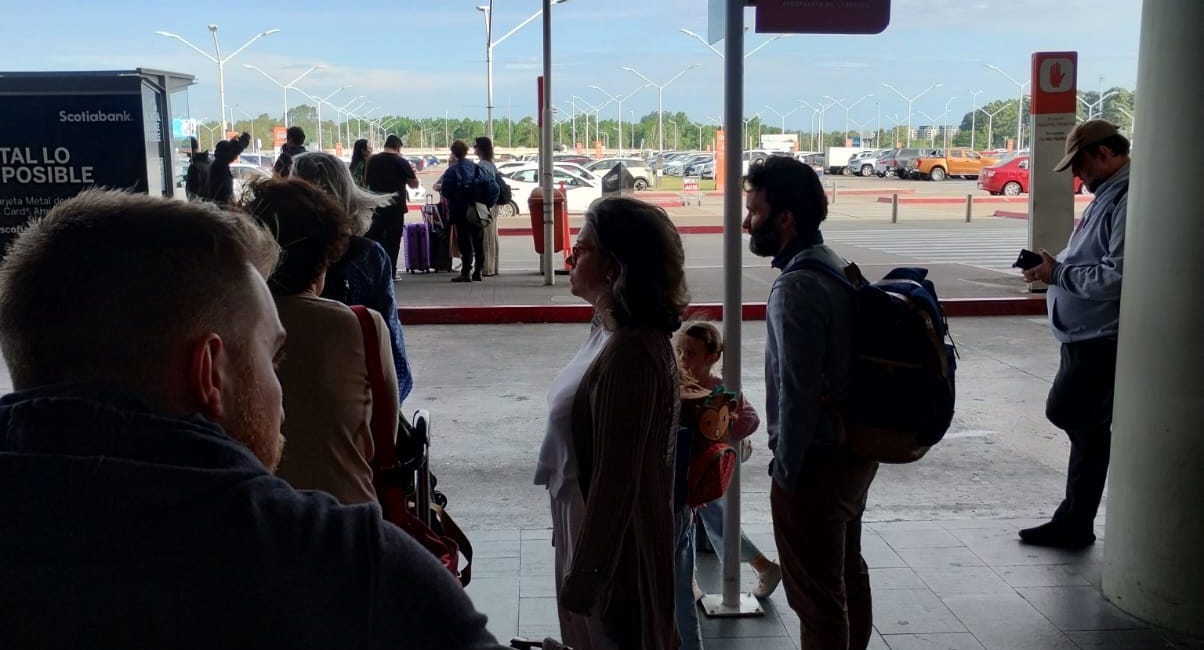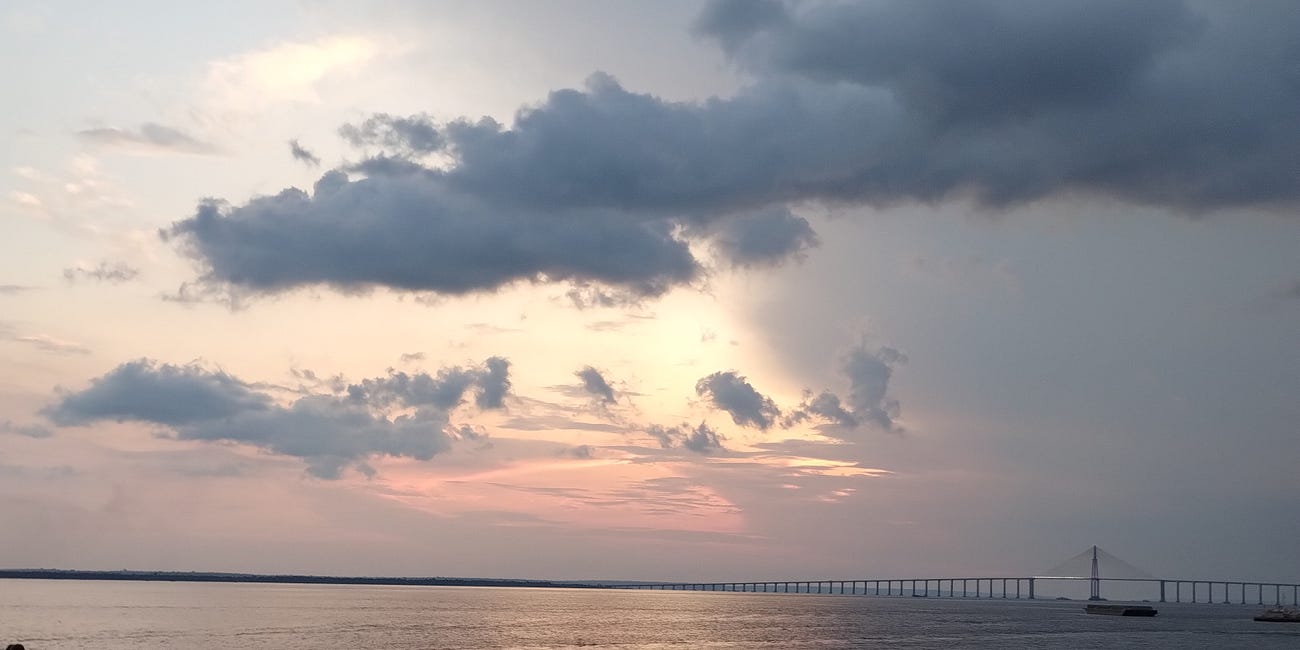The valley of lost items
We often enter the 'travel anxiety' mode of a supposed need to visit everything, and we end up not relaxing as we should
I was reading your newsletter and wanted to ask how you make your travel itineraries. Do you use any apps? Do you mark spots on Google Maps? Tell me, I need to make one.
I received this message from a friend and feared my answer would sound rude or lazy. But I was as honest as possible: my nomadic life is without itineraries.
There is a minimum of planning, of course. I'm not the type of nomad who decides the next destination day after day or week after week. I already know where I'll be until the beginning of July, with everything paid for until May.
But, within each destination, I choose what I will do daily. Obviously, some places interest me, and I don’t intend to leave without visiting. So, I create a kind of virtual itinerary in my head, but without committing to days or schedules. I wake up on Saturday and Sunday mornings and think: "What to do today?".
Enjoying walking also helps in this process. Surprises appear along the way. I also read local newspapers or follow Instagram pages that are not so focused on tourists, which always inform me about exciting events in the city.
This, eventually, prevents me from knowing a museum that requires buying tickets in advance, but I have not yet left any city regretting something I didn't do.
The fact that I spend a longer time in each city helps a lot. But, even before being nomadic, I used to travel without itineraries. It's a style: everyone has their own. I think we often enter the "travel anxiety" mode of a supposed need to visit everything, and we end up not relaxing as we should. That's why I talk so much about slow travel here, even for shorter trips.
This does not mean that nomads do not have routines. I have a pattern, especially from Monday to Thursday. Below some texts that better address these subjects:
Feeling like a local will change forever the way you travel
A nomad lives in limbo: neither a tourist nor a local. "Being local" is hard to define. Probably, we are only locals where we were born and raised. In most other places throughout life, we get accustomed to them. It's also easier to become a local in more cosmopolitan cities, like São Paulo or New York.
While traveling, you must search for problems
Today, this newsletter turns one year old. It's an extraordinary moment. This is the only personal project that has lasted this long. And No Direction Home continues with the aim of being a reference for those seeking a more flexible life. If you think the weekly content is interesting, you can help me in two ways: by sharing it with your friends or by …
The challenging art of slow travel
The advantage of working and living anywhere is not feeling rushed during short trips. Before adopting a nomadic lifestyle, I spent 21 out of my 30 vacation days traveling a week in each place. I could get to know only three cities at once. Nomadism, therefore, is a
'I don't want to be happy, I want to have an interesting life'
During my Sunday readings, I discovered an outstanding interview from 2014 with Contardo Calligaris, a renowned Italian psychoanalyst who lived in Brazil and passed away in 2021. The topic is happiness. Here are some excerpts that I'd like to highlight. I'll continue afterward.
The headache is mine, too
Last week, I celebrated that Dudan's headache, the host of my Airbnb in Porto Alegre, was not mine. Maybe it was too soon. After over a week of struggling with the company that rents through Airbnb to get the internet fixed, I changed apartments in the same building.
What was supposed to be good news came with another problem: the air conditioning is not working. And the days in São Paulo are suffocating. I started, again, an attempt to repair or to move.
In other words, generally, the headaches are not mine. But, when they are, they are as hard to endure as those of a non-nomad. Renting an Airbnb in São Paulo it's been a terrible experience. Expensive and poor service, usually from a company that manages multiple apartments.
I wrote in 2023 about how I miss when the Airbnb experience was more friendly.
Valley of lost items
I forgot my headphones —the best I've ever had— in the gym. In everyday life, it would just be a matter of going to the gym and, with a bit of luck, finding it at the reception. However, I have a monthly plan that allows me to go to any establishment of the largest gym franchise in Brazil. And I have no idea in which gym I left it, since I attended one in Avaré and several in São Paulo. And I only realized many days later. I gave up looking.
And this valley of lost items is deep. Sometimes, I was lucky, like the four shirts I left in Porto Alegre and a friend picked up from the host, or in Rome when I changed Airbnb and rescued my JBL speaker that I had forgotten in the first one.
But many things were left behind, like clothes and chargers. I'm an expert in going from one Airbnb to another until leaving an item behind. The reason for this, most of the time, is the rush. Since I have few things, I pack my suitcase in the last minute. It almost always ends badly.
Who is this remote worker?
During the pandemic, you did a remote traineeship and started working for a São Paulo newspaper while in Rio. How was that experience? Have you worked remotely before?
The traineeship experience was very important for consolidating my career and, subsequently, working at one of the largest newspapers in the country. The fact that it was remote was crucial because I wouldn't have the financial means to go to São Paulo, leave my internship, and sustain myself there just studying. At the time, I was still in college, it was a demanding routine, but I couldn't leave everything behind and pursue the traineeship dream. So, being remote was essential for me and many other colleagues throughout Brazil.
I had worked remotely before because of the pandemic, since March 2020, so I was already used to it. However, when I started, I needed to adapt to the remote format, and since then, I have considered it the best working format currently.
What do you consider the advantages of remote work? And the disadvantages?
I confess it's difficult for me to speak about the disadvantages of remote work because the advantages are much greater. The strength of remote work is the comfort of not relying on public transportation, especially in Rio de Janeiro, which is so deficient. I am also concerned about safety, as I am a woman, and, unfortunately, the urban scenario is hostile.
Additionally, I can have more time to manage other important aspects of my life, such as my physical and mental health. After almost four years of remote work, investing in my quality of life is practically non-negotiable, not to mention that it directly impacts the quality of my work.
As a negative aspect, I can mention the decreased team integration and the demotivation for those who don't like working alone, which is not my case. However, these disadvantages are easily overcome with short daily meetings, sporadic team gatherings, working in coworking spaces, etc.
You faced a dilemma due to the possibility of moving to São Paulo. Can you tell us a bit about that? Why didn't you want to go? What decision did you make?
I need to say that I initially wanted to go to São Paulo, but I couldn't at that moment because I needed to finish my studies in college. However, over time, I started suffering mentally from the stress of finishing my degree and the frenetic work pace, and I had a depression episode. I sought specialized help and also relied on my support network, and I had the necessary strength to understand that moving to a bigger city than mine, with a high cost of living and alone, would only worsen my health.
I asked my manager, who promptly listened to me and tried to intercede on my behalf, but waiting more than a few months was impossible. So, I decided to look for a job in my city, which I quickly found and helped me complete my treatment and support myself.
You are about to start a new remote job from Rio, with occasional trips to São Paulo. Can you tell us a bit about how it will be?
I will explore a world I've always wanted to study deeper: press relations. I like to joke that I'll be on the other side of the counter now since I was a reporter recently. I'm very excited to build relationships with journalists, participate in events, and have contact with exciting topics, such as technology and startups.
You are an advocate for flexible work models. How do you see this market currently? What tips would you give to those who are also interested?
The flexible work models market worked well during the pandemic despite us living through dark times. I didn't realize before that it was possible to do so many things —and do them well— remotely. However, since the reopening, I feel there has been a drastic decrease in remote job opportunities. I see dishonest ads, indicating that the position is remote but the person needs to live in a specific city. So, it's not remote, right?
This is a long discussion, but we know there's a great interest from the real estate market, for example, in bringing people back to offices, sucking their time through long daily commutes and the need for constant surveillance. It's a time I could spend on physical activities, moments with family, and leisure.
What I do to search for remote jobs is: 1) hunt manually through postings, especially on LinkedIn, and in the professional groups I participate in on WhatsApp; 2) follow professionals who talk about the topic because they are always advertising opportunities and teaching the "ins and outs"; 3) look for jobs abroad that pay in dollars but require fluency in English.
Why do you consider remote work important?
Remote work is important for several reasons; among them, I highlight the professional environment's quality of life and diversification. We live in an unequal society, in which many people need to sacrifice a lot to have the basics in their homes, having to deal with a tiring journey, which includes not only many extra hours but also many hours on public transportation. And, speaking of women, there is often a double workload, making them work in the office and at home, taking care of the household and children.
Working remotely is not the solution to all our problems. However, it is an excellent way to bring more women into leadership positions, for example, and bring more comfort, safety, quality of life, and what is the main and most precious, TIME.








